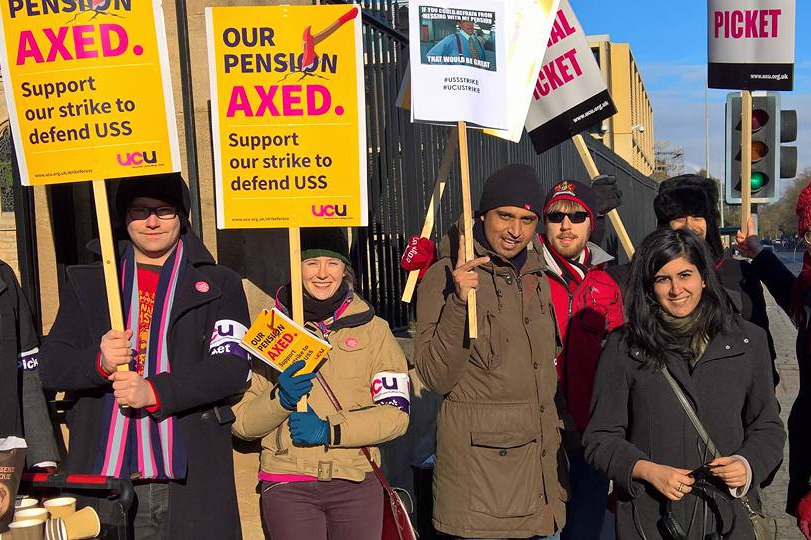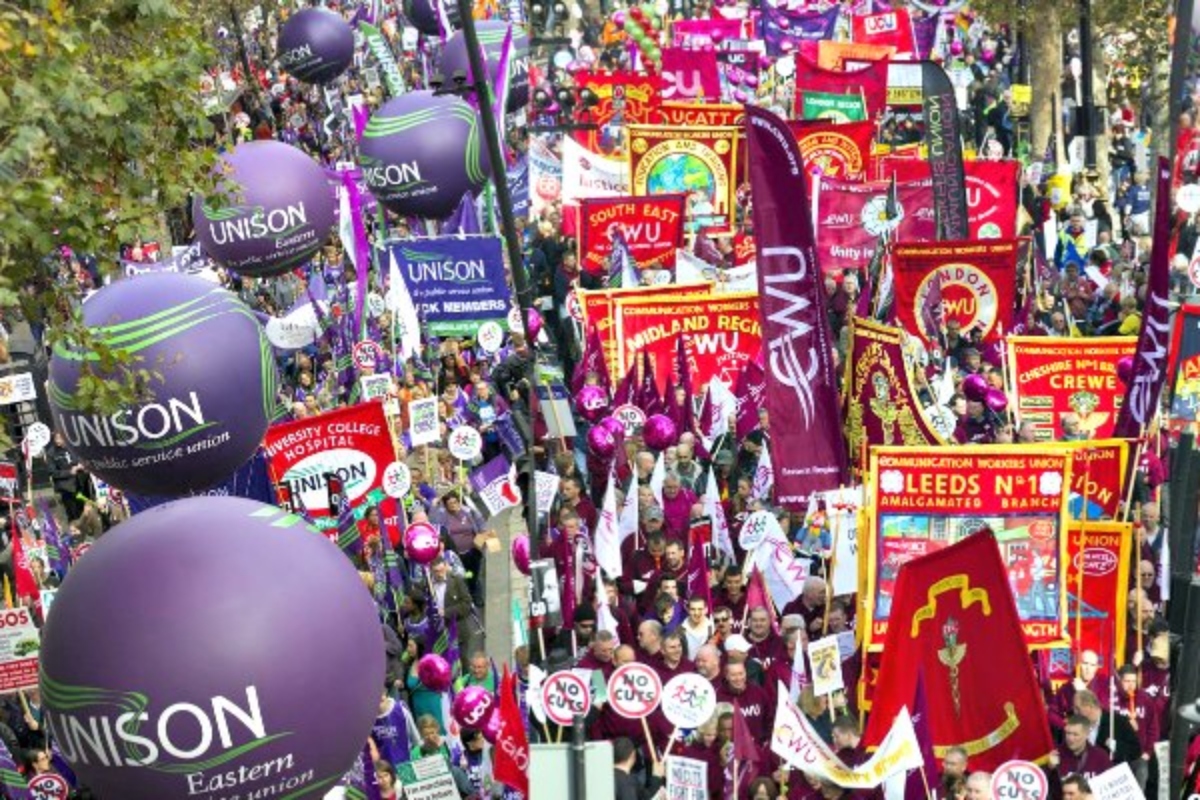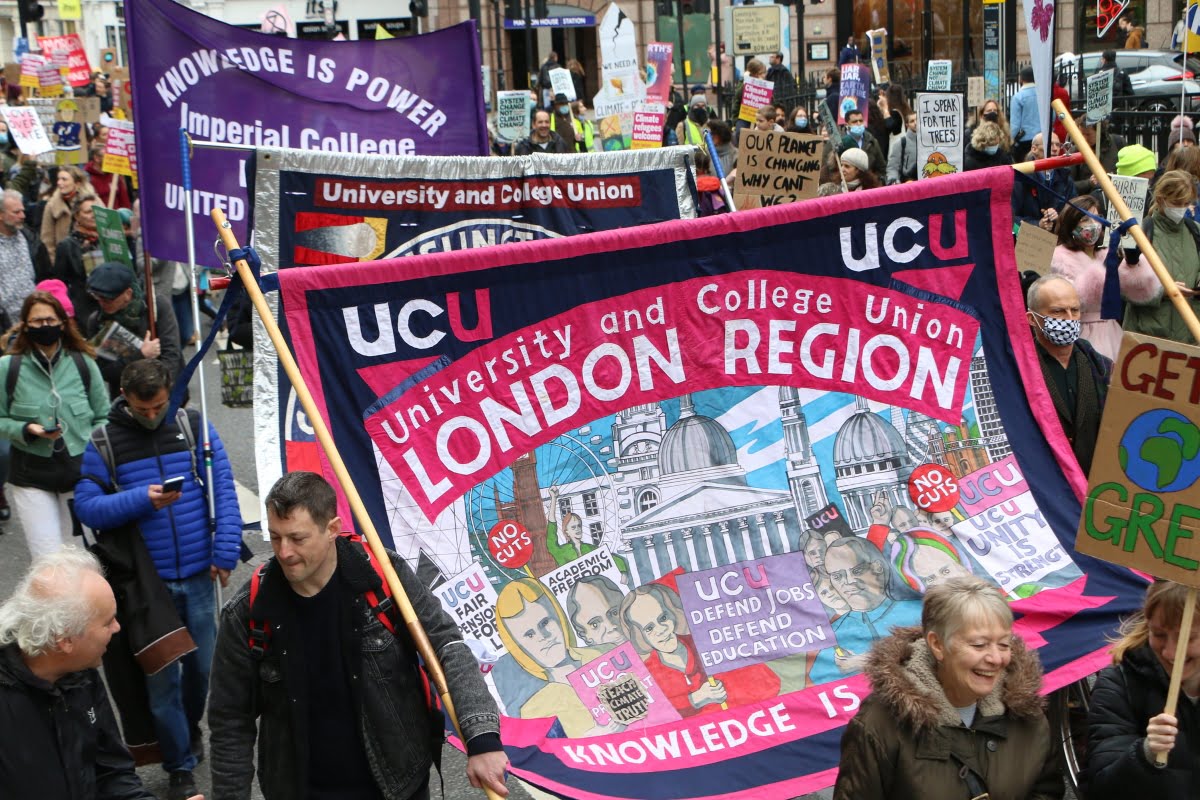Following a recent ballot, UCU members in higher education are set to take strike action once again. A debate has opened up in the union about how to best achieve a victory. As part of this, UCU Marxists present here a strategy for winning.
In March 2020, the UCU reached the end of fourteen days of strike action without reaching any solution on the issues under dispute, namely: the USS pensions scheme and the ‘Four Fights’, which encompasses pay, inequality, workload, and casualisation.
The then-burgeoning COVID-19 crisis cut across any plans to escalate and expand the struggle. But 20 months later, the issues that the UCU were fighting over continue to plague the sector and remain unresolved. In many ways, they have worsened, exacerbated by the pandemic.
In this context, it’s unsurprising that as we return to ‘normality’ on campuses, members have overwhelmingly voted in favour of strike action on both disputes once again.
Ballot results
 Despite the ballot only running for a short period, 53% of members voted in the USS dispute and 51% in the Four Fights dispute, with 76% supporting strikes over pensions and 71% supporting strikes over pay and conditions. Meanwhile, 88% and 85% of voting members supported action short of a strike over these issues, respectively.
Despite the ballot only running for a short period, 53% of members voted in the USS dispute and 51% in the Four Fights dispute, with 76% supporting strikes over pensions and 71% supporting strikes over pay and conditions. Meanwhile, 88% and 85% of voting members supported action short of a strike over these issues, respectively.
The union has rightly called this a ‘clear mandate’ for strike action, with both ballots succeeding despite the Tory anti-trade union laws that are designed to hamstring strikes.
This is the third time in four years that members have strongly supported strike action, showing the strength of feeling on campuses. Although historically lecturers may have been privileged workers, in the present day the profession is characterised by stagnant pay, unbearable workloads, job insecurity, and increased casualisation.
This is perhaps best demonstrated by the case of Aimée Lê, a third-year postgraduate researcher who, despite having a teaching role alongside her research, was unable to pay rent, so was forced to live in a tent while she completed her PhD.
While this is undoubtedly an extreme situation, insecurity and low pay are not uncommon. Many higher education workers will find themselves struggling at the end of the month, or will be let go by an institution at the end of the summer term, with no guarantees about whether a job awaits them in the autumn.
Winning strategy
 We must be clear, though: the failure to resolve the Four Fights and the USS pensions disputes isn’t because they are unwinnable. It is a question of strategy and perspective.
We must be clear, though: the failure to resolve the Four Fights and the USS pensions disputes isn’t because they are unwinnable. It is a question of strategy and perspective.
In that regard, we have to be honest in saying that while the wave of escalating strikes in 2018 were effective, it was an error by the leadership to call to repeat this strategy in 2019-20. They were predictable, and university management felt confident that they could ride it out.
By the end, those on the picket lines knew this too. After nearly a month of action between November 2019 and March 2020, a resolution was no nearer, and UCU negotiators were making concessions on pay demands, leaving both resources and morale depleted.
Similarly, the current strategy proposed by the leadership again has serious flaws. The leadership is initially proposing two consecutive days of strike action in November – one over the USS pensions dispute, and one over the Four Fights.
There are two significant problems with this proposal. Firstly, it is not clear what this action is likely to achieve, nor what purpose it serves. This strike shouldn’t be about flexing our muscles or letting off steam – it should be conducted with the sole aim of winning the two struggles. It’s not entirely clear how the proposed action furthers that aim.
Secondly, aside from the meek nature of this proposal, it flies in the face of motions passed at this year’s Higher Education Sector Conference, which clearly called for the Four Fights and USS struggles to be linked.
This is the clearest signal yet that the leadership is in danger of moving toward a position similar to that of the previous, right-wing leadership, which de-prioritises issues such as casualisation.
It is imperative that members remain vigilant against any attempt to sell the Four Fights dispute short in order to wage a more narrow and limited struggle over pensions. Only by firmly linking the two disputes will many younger members be convinced to strike, and the systematic connection between attacks on pensions and other conditions made clear.
Beyond this, despite achieving a successful mandate for 54 branches to take strike action over the Four Fights, the leadership is proposing a total reballot in the new year. This is because, based on turnout and voting, an aggregated ballot would have achieved a turnout of 51% and support for strike action in all workplaces.
Reballoting on an aggregated basis now, however, would not only take the wind out of the sails of the growing mood for action over the Four Fights. It is also based on the questionable assumption that the successful Get the Vote Out (GTVO) campaign could be replicated and achieve a similar result.
Beyond this, if the aggregated ballot fails, it will needlessly give management ammunition to call the legitimacy of the strike into question. If they chose to bring this to court – given the class character of the justice system, and the recent experience of unions such as CWU – UCU would likely lose.
Instead, the leadership should be calling for action short of a strike to begin immediately, with a view to a marking boycott over the Christmas period. In the meantime, the union should make its primary focus the reballoting of branches with a 40-50% turnout over both disputes. This reballoting should begin immediately, and be concluded by the end of the year.
This reballoting process should be conducted with the explicit perspective of calling indefinite strike action early in 2022.
The move to indefinite action would signal a serious escalation of the union’s struggle, and would represent a terrifying prospect for bosses at institutions around the country. It would signal to both members and bosses that this is not a ‘business-as-usual’ strike, but a decisive struggle over the future of higher education.
Strike wave
 The appetite for strike action within UCU is coming at a time when industrial action is beginning to ramp up in all sectors across the country. After the bosses made bumper profits during the pandemic off the back of the working class, and in the face of high levels of inflation, workers are beginning to fight back.
The appetite for strike action within UCU is coming at a time when industrial action is beginning to ramp up in all sectors across the country. After the bosses made bumper profits during the pandemic off the back of the working class, and in the face of high levels of inflation, workers are beginning to fight back.
What UCU Marxists have consistently emphasised is that the problems facing our sector – from the Four Fights, to the fight against redundancies, to the unsafe return to classrooms and campuses – are not isolated and exclusive to higher and further education.
Rather, we are living in a time of unprecedented global economic, political, and social crisis where workers in every sector face inequality and attacks on pay, conditions, and jobs.
But this does not mean that these fights represent an endless, unwinnable struggle. Substantial victories are possible, but the trade union struggle needs to become part of a political struggle for socialism – the conditions for which have never been more ripe.
Every branch should establish strong links not only with other unions on campus, but with unions in the towns and cities to which they belong. On campus, there is significant discontent among Unison members, which opens the door for coordinated action. Similarly, teachers in the NEU are at breaking point.
Coordinated action could be arranged across the entire education sector, which could then act as a springboard for a one-day public sector strike, alongside workers in the NHS and local councils – marking the beginnings of a militant struggle against this corrupt and criminal Tory government.
Locally- and nationally-coordinated action with other unions should be pursued not only because it will be highly effective, but because, fundamentally, we face the same problems as cleaners on campus in Unison; as teachers in the NEU; as CWU members in Royal Mail; and as an USDAW members in our local Tesco: unsafe working conditions, job insecurity, and cuts to vital public services such as health, transport, and education that we all rely on.
Such attacks can only be fought with a united movement, on a clear class basis, and with a bold socialist programme.
This is the kind of fighting strategy our leadership should be adopting. Ultimately, all disputes are winnable. It is just a matter of being prepared to do whatever it takes.






